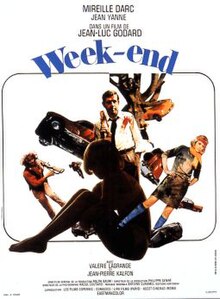Weekend (1967 film)
| Week-end | |
|---|---|
 Film poster | |
| Directed by | Jean-Luc Godard |
| Written by | Jean-Luc Godard |
| Starring | Mireille Darc Jean Yanne |
| Cinematography | Raoul Coutard |
| Edited by | Agnès Guillemot |
| Music by | Antoine Duhamel |
| Distributed by | Athos Films |
Release date |
|
Running time | 105 minutes |
| Country | France |
| Language | French |
| Budget | $250,000 (estimated) |
Weekend (Template:Lang-fr) is a 1967 black comedy[1][2] film written and directed by Jean-Luc Godard and starring Mireille Darc and Jean Yanne, both of whom were mainstream French TV stars. Jean-Pierre Léaud, iconic comic star of numerous French New Wave films including Truffaut's Les Quatre Cent Coups (The Four Hundred Blows) and Godard's earlier Masculin, féminin, also appears in two roles. Raoul Coutard served as cinematographer; Weekend would be his last collaboration with Godard for over a decade.
The film was nominated for the Golden Bear at the 18th Berlin International Film Festival in 1968.[3][4]
Plot
Roland (Jean Yanne) and Corinne (Mireille Darc) are a bourgeois couple, although each has a secret lover and conspires to murder the other. They set out by car for Corinne's parents' home in the country to secure her inheritance from her dying father, resolving to resort to murder if necessary.
The trip becomes a chaotically picaresque journey through a French countryside populated by bizarre characters and punctuated by violent car accidents. After their own car (a Facel-Vega) is destroyed in a collision, the characters wander through a series of vignettes involving class struggle and figures from literature and history, such as Louis Antoine de Saint-Just (Jean-Pierre Léaud) and Emily Brontë (Blandine Jeanson).
Corinne and Roland eventually arrive at her parents' place, only to find that her father has died and her mother refuses to give them a share of the spoils. They kill her and set off on the road again, only to fall into the hands of a group of hippie revolutionaries (calling themselves the Seine and Oise Liberation Front) that support themselves through theft and cannibalism. Roland is killed during an escape attempt; he is chopped up and cooked.
Cast
- Mireille Darc as Corinne
- Jean Yanne as Roland
- Paul Gégauff as Pianist
- Jean-Pierre Léaud as Saint-Just
- Blandine Jeanson as Emily Brontë
- Yves Afonso as Tom Thumb
- Juliet Berto as The Radical
Background
According to a letter from the Argentine writer Julio Cortázar to his translator Suzanne Jill Levine, the indirect inspiration for the movie was Cortázar's short story "The Southern Thruway." Cortázar explained that while a British producer was considering filming his story, a third party presented the idea to Godard, who was unaware of its source. Because he had had no input on the making of the film, Cortázar vetoed the suggestion to translate the story's title as "Week-End" to take advantage of the tie-in.[5]
References
- ^ "Week End: Jean-Luc Godard". metalasylum.com. Retrieved 2010-09-17.
- ^ "Week End (1967): Review". movie-gazette.com. Retrieved 2010-09-17.
- ^ "18th Berlin International Film Festival". berlinale.de. Retrieved 2009-01-09.
- ^ "Awards for Weekend". IMDb.com. Retrieved 2009-01-09.
- ^ Cortázar, Julio. Cartas (2012) tomo 4 p.292.
External links
- Weekend at IMDb
- Weekend at Rotten Tomatoes
